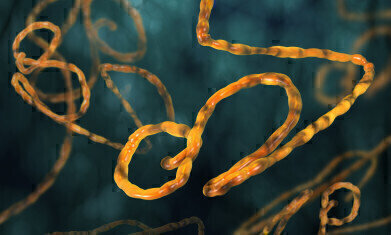News
Ebola - What Are the Symptoms?
Nov 04 2014
With over 13,000 confirmed, probable or suspected cases and the death toll reaching almost 5,000, the current Ebola outbreak in West Africa is the largest known in history. A serious, usually fatal disease, Ebola has severely affected the countries of Liberia, Sierra Leone and Guinea where the majority of cases have occurred, although a handful of cases have now been confirmed in the US, the UK, Spain, Germany, France, and Norway.
On Tuesday 14th October, the UK government introduced health screening at Heathrow airport and St Pancras Eurostar station for visitors from infected areas, with further plans to roll out screening at other major airports across the UK in the coming weeks. With one confirmed Ebola case in the UK, and rising cases in West Africa, gaining a better understanding of the Ebola virus will save lives.
How is Ebola spread?
Spreading through infected droplets such as vomit, faeces, urine and blood, the Ebola virus can enter the body through the eyes, mouth, nose, or broken skin. By coming into direct contact with an infected person’s blood or body fluids, you are at risk of contracting the virus.
While most people are infected by giving care to an infected person, the Ebola virus can survive for several days outside the body. Ebola can also be contract through contact with soiled clothing, having sex without using a condom, and by handling unsterilised needles and medical equipment.
Spotting the symptoms
It is vital to familiarise yourself with Ebola symptoms, especially if you have visited or will be visiting an infected area.
With its sudden onset of symptoms, people with Ebola start showing signs within 2 to 21 days of becoming infected. These swiftly-occurring symptoms include a fever, headache, sore throat, and joint and muscle pain.
Following these milder symptoms, diarrhoea and vomiting, stomach pain, a rash, and impaired kidney and liver function will quickly ensue.
Internal bleeding is one of the final stages of the virus, with many patients also bleeding from the mouth, nose, eyes, or ears. While there is currently no licensed vaccine or treatment, symptoms are treated through intravenous therapy.
The NHS warns that other tropical diseases such as malaria, dengue fever, and typhoid fever have similar symptoms, and it is essential to stay and home and contact the emergency services as soon as symptoms occur.
How to avoid the Ebola infection
Healthcare and laboratory workers are at risk while treating infected patients or handling Ebola samples for research purposes. The World Health Organisation (WHO) recommend practicing hand and respiratory hygiene, wearing face protection, and non-sterile long-sleeved gowns and gloves when caring for a sick person. Preventative safety precautions must be taken to ensure that no contact is made with any infected body fluids or organs, and all contaminated clothing or material should be disposed of safely. This article, Avoiding Ebola Infection - 4 Guidelines, looks at this topic further.
Digital Edition
Lab Asia Dec 2025
December 2025
Chromatography Articles- Cutting-edge sample preparation tools help laboratories to stay ahead of the curveMass Spectrometry & Spectroscopy Articles- Unlocking the complexity of metabolomics: Pushi...
View all digital editions
Events
Jan 21 2026 Tokyo, Japan
Jan 28 2026 Tokyo, Japan
Jan 29 2026 New Delhi, India
Feb 07 2026 Boston, MA, USA
Asia Pharma Expo/Asia Lab Expo
Feb 12 2026 Dhaka, Bangladesh



















